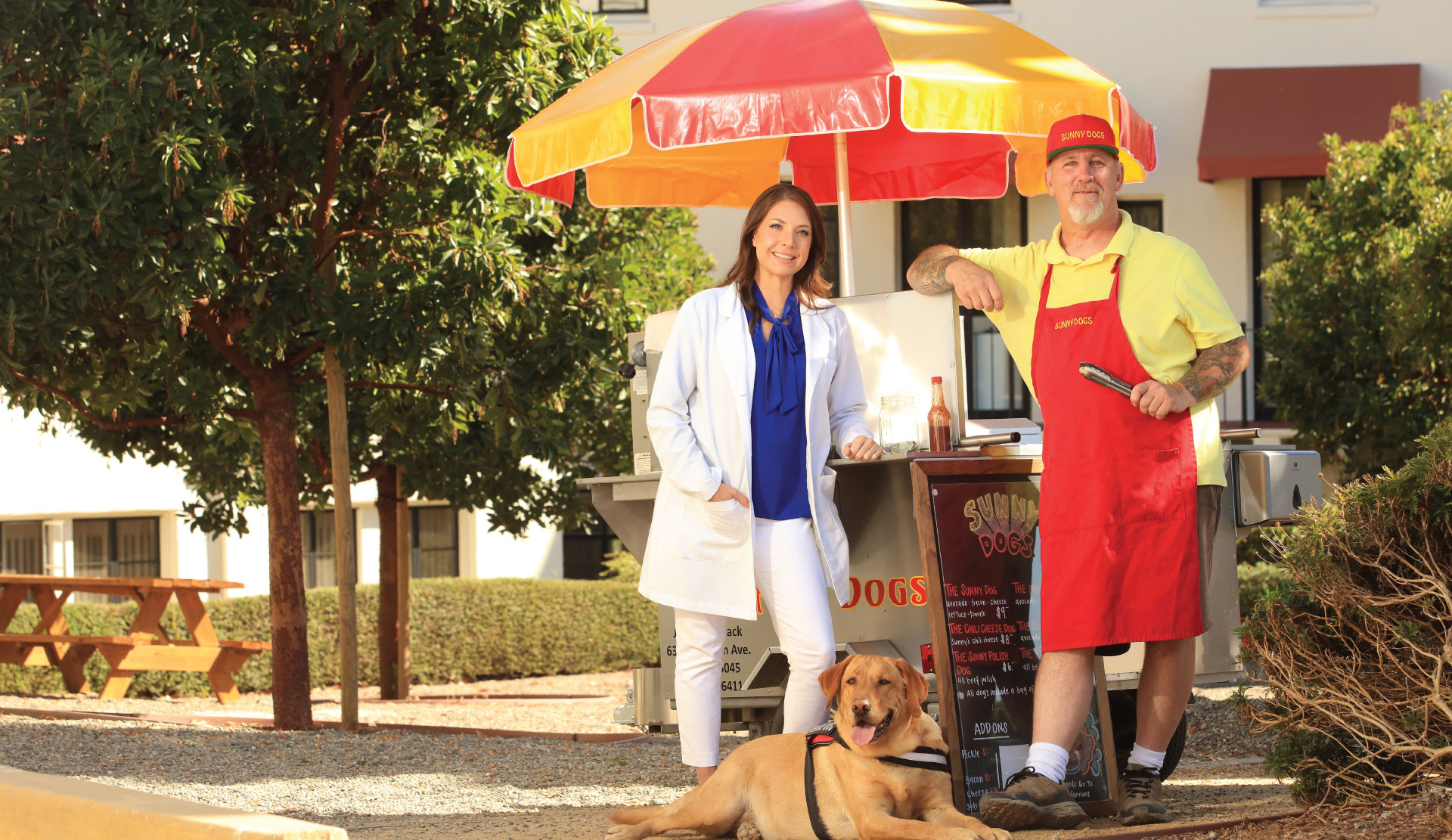
Re-learning to speak, swallow, and so much more
Speech language pathologist and cancer survivor inspire each other
James Womack’s childhood was traumatic, unstable, unsafe. By age 9, he had his first tattoo. At 15, he was living in a car. His adult years were rough-and-tumble too. By the time he was diagnosed with stage 4 throat cancer at age 51, he figured he should have already died several times.
But he has always been a survivor. Now, five years later, he is cancer-free — and filled with gratitude.
“If I can help even one person get through their cancer, build the courage and determination to endure the process,” he says, “then it’s worth sharing my story. I’m not anyone special; I’m just an average guy.”
Womack’s cancer journey started with a visit to Dr. Steven Vetter, an ear, nose, and throat specialist. A sore throat had become so painful that he couldn’t easily get air or swallow a single aspirin. Within two hours, he was at Community Hospital of the Monterey Peninsula getting an emergency tracheotomy to keep breathing. Vetter had found a tumor that reduced Womack’s airway to the diameter of a cocktail straw; he was given a five-percent chance of survival.
"The day I rang that bell, I was born again. That’s when I was granted a second life, when I realized I wasn’t going to die."
— James Womack, cancer survivor
Womack spent 63 days in the hospital, his care guided by oncologist Dr. Jerry Rubin until Rubin passed away in 2018. He weathered 33 rounds of radiation and 6 rounds of chemotherapy. At first, the treatments were tolerable. Once the radiation started to burn the inside of his throat, though, it was a matter of getting through the intolerable.
When he did, he followed the tradition in Radiation Oncology at Community Hospital of ringing a bell mounted on the wall outside the treatment room, the staff gathered around him in celebration.
“The day I rang that bell, I was born again,” Womack says. “That’s when I was granted a second life, when I realized I wasn’t going to die.”
But he had lost the ability to swallow, eat, or speak. That’s when he met Paige Vega, the speech language pathologist with whom he would spend the next three-and-a-half years, relearning the vital functions that enabled him to survive and thrive once again.
“Dr. Rubin saved my life,” Womack says. “Paige Vega gave it back to me. She’s one of the most amazing people I’ve ever met. When she’s working with me, she’s all about my well-being. She taught me to trust her, to trust the process, to trust that my life is worth fighting for.”
Several times a week, they met for an hour of therapy focused on swallowing and speech, with Womack relentlessly doing exercises to reach his goals.
“Once we’d built trust,” Vega says, “he could start learning how to swallow again. It’s not a pretty process. It’s an unreal, delicate process, where sometimes food goes down, and sometimes it comes back up all over you. It’s very humbling.
“Now, James can go to a restaurant and eat with someone. A big part of swallowing is the social aspect of eating. When we can’t participate in that, it’s isolating. It takes a toll on self-esteem.”
A few months after Vega had discharged her patient, Womack contacted her and said his “chemo brain” wasn’t working well. It was keeping him from doing what he was used to, including his job as a long-haul trucker. She brought him in for cognitive therapy.
“Chemotherapy and radiation are hard on the body,” Vega says. “I asked him to reimagine what he wanted to do with his new chance at life.”
Focusing on his gratitude for his renewed ability to eat, he realized he wanted to feed people. He landed on the idea of starting a hot dog cart.
“I created patient-specific tasks that targeted attention, concentration, problem-solving, and organization,” Vega says. “As he became stronger and more confident in his skills, I transitioned into tasks that worked toward building his business, such as learning about health codes, getting his food handler certificate, filling out forms, and creating cost/profit sheets.”
Finally, Womack was ready to launch. He named the business “Sunny Dog,” after his retriever Sunny. On his first day in business, he parked his cart outside Hartnell Professional Center, where Vega works, and served free hot dogs to everyone who had helped him in his recovery.
Now, he can usually be found in front of the harbor at Moss Landing, selling a variety of hot dogs from his cart. On the way home, he stops to give leftover hotdogs to the homeless in his San Juan Bautista community.
“He has one of the most positive and persevering attitudes around,” Vega says of her former patient. “I am so very proud of him.”

